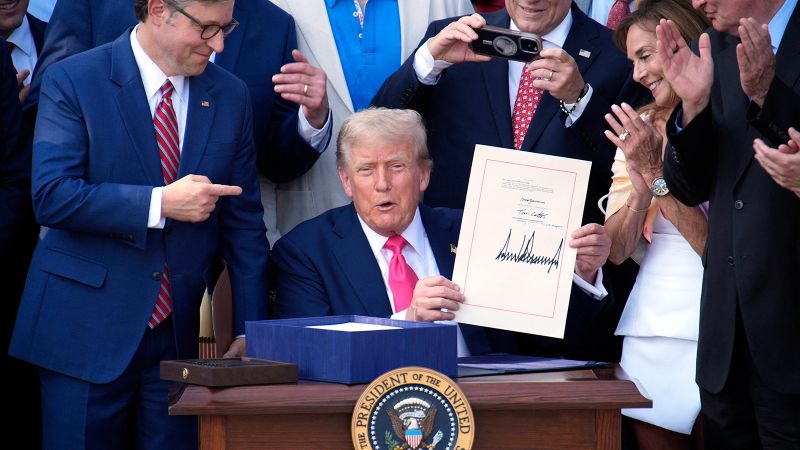In recent legislative developments, President Donald Trump unveiled a comprehensive law, often referred to as his “big, beautiful bill,” which has garnered significant attention for its extensive provisions favoring business interests. This extensive 900-page legislation, which the president signed this month, vividly illustrates the power of lobbying, with many organizations working passionately to ensure that their specific needs and desires were reflected in the final version of the law.
The new law underscores Trump’s ambition for his second-term domestic agenda, showcasing tax cuts mostly benefiting high-income earners. An infusion of approximately $170 billion is allocated for immigration enforcement and mass deportations, signaling a substantial shift in domestic policy while simultaneously scaling back on expenditures in other critical areas, notably Medicaid. This juxtaposition speaks volumes about the priorities established through aggressive lobbying efforts.
Various special interest groups embarked on strategic campaigns to shape the bill, successfully carving out benefits that serve their industries. For instance, significant tax breaks for private aviation were included, allowing companies to write off the entire cost of private jets in the first year of ownership. The law effectively makes permanent a tax provision that allows for full expensing—a point of contention in the ongoing debate regarding tax equity. These developments have ignited criticism, with some advocating that such arrangements serve as giveaways to the wealthiest Americans, essentially subsiding private jet usage through taxpayer funds.
However, the bill failed to satisfy everyone, as various provisions faced significant pushback from the public and were stymied by intricate budget rules. With narrow Republican control of Congress, votes from Democrats were largely absent, forcing advocates to navigate the legislative process with care and precision. Lobbying efforts continue on behalf of groups that feel sidelined, particularly within industries like health care, which are eager to push for a second chance at crafting legislation that favors their interests.
An insightful analysis of the law reveals numerous included provisions—some successful as a result of deft lobbying, while others faltered in the face of collective public sentiment and procedural regulations in Congress. Specifically, the bill allows developers to access tax-exempt bonds for constructing spaceports, enhancing investment opportunities in the burgeoning commercial space sector. It has been interpreted as a boon for corporations helmed by billionaires like Jeff Bezos and Elon Musk, with critics labeling it as an extravagant gift.
The realm of pharmaceuticals also witnessed advances. Certain drugmakers and advocacy groups for rare diseases can celebrate as the new legislation augments protections and incentives under the Medicare drug price negotiation program. Yet, this victory comes with a caveat: detractors have raised alarms over potential consequences for pricing and accessibility, reiterating that bolstered protections could lead to inflated costs for consumers.
In a particularly nuanced development, the legislation also encapsulated a mini “farm bill,” which sought to deliver critically needed subsidies to farmers and ranchers. This inclusion reflects a responsive governmental stance amid growing financial pressures faced by the agricultural sector, though it has not come without its complexities.
Conversely, not all provisions made the final cut, notably reforms to the practices of pharmacy benefit managers (PBMs) within Medicaid, frustrating advocates who campaigned for long-sought changes. The campaign demonstrated the intense tug-of-war dynamic at play, revealing stark contrasts between the interests of major corporations and the voices of everyday consumers regarding health care accessibility.
Furthermore, the gambling industry emerged with its own set of challenges amid the legislation. A last-minute alteration to tax policies regarding gambling losses suggested a dissonance between the desires of industry leaders and legislative outcomes, as the professional gambling community expressed outrage over adjustments that appeared detrimental to their interests.
As the dust settles on this ambitious bill, it becomes paramount to reflect on the broader implications for businesses and the American public. The intersections of significant tax breaks, lobbying power, and the legislative process depict a complex landscape where interests are often left in competition, navigating competing desires, priorities, and influences that may ultimately shape the socio-economic fabric of the nation.











